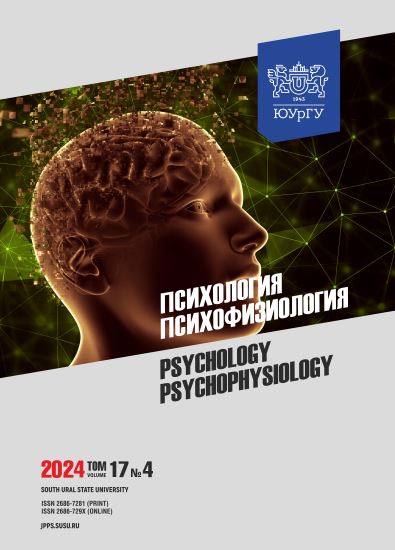Development of value-sense sphere of adolescents' personality in the conditions of additional education
Abstract
Adolescent development is crucial in modern society, with a pressing need to define effective guidance strategies. Current educational systems and families struggle to address the fundamental life questions faced by teenagers, including finding meaning, developing values, and forming worldviews. There is a gap in systematic approaches to cultivating value orientations, particularly in the context of extracurricular education. Aims: This paper aims to identify differences in value and meaning orientations among adolescents receiving versus those not receiving additional education. Materials and methods: The sample involved 150 adolescents (aged 15–16) from a comprehensive school in Barnaul, Altai Krai. The sample was divided into 2 groups: 52 schoolchildren not engaged in extracurricular activities, 98 engaged in creative extracurricular activities (choreography, fine arts, music). Standardized assessment tools were used, including the Value Orientations of Adolescents questionnaire by V. Sopov and L. Karpushina and the System of Life Meanings questionnaire by V. Kotlyakov. Results: Significant differences in value and meaning orientations were observed between the two groups of adolescents. Adolescents participating in extracurricular activities demonstrated a prevalence of self-realization and cognitive meanings, arising from the need for self-promotion and self-enhancement. In contrast, adolescents not engaged in extracurricular activities placed greater emphasis on family relations and caring for loved ones. Conclusion: participation in additional education can serve as a catalyst for developing the value and meaning sphere of adolescents. Future research should focus on the most effective methods and approaches to additional education to enhance value and meaning orientations among adolescents.
Downloads
References
2. Stein H.T., Edwards M.E. Adlerian psychotherapy. Eds. M. Herson, M.H. Sledge. Encyclopedia of Psychotherapy. Academic Press. 2002:23–31. DOI: 10.1016/B0-12-343010-0/00004-0.
3. A personal message from Carl Rogers. Contributions to Client-Centered Therapy and the Person-Centered Approach. N.J. Raskin. Herefordshire. United Kingdom: PCCS Books, Ross-on-the-Wye. 2004:314.
4. Frankl V. Logos, paradox and the search formeaning. Cognition and psychotherapy.
Eds. M.J. Mahoney, A. Freeman. NewYork. Plenum. 1985:259–275.
5. The black books: 1913–1932: notebooks of transformation. C.G. Jung; ed. S. Shamdasani; transl. M. Liebscher, J. Peck, S. Shamdasani. Stiftung der Werke von C.G. Jung and W.W. Norton and Company. 2020;1:113
6. Maslou A.H. Motivation and Personality. New-York. Harper and Row. 1989:472.
7. Rokeach M. Beliefs, Attitudes and Values. San-Francisco: Josey-Bass Co, 1972:214.
8. Schwartz S., Bilsky W. Toward a Universal Psychological Structure of Human Values. Journal of Personality and Social Psychology. 1987;53(3):550–562. DOI: 10.1037/0022-3514.53.3.550
9. Leontev A.N. Deyatelnost. Soznanie. Lichnost [Activity. Consciousness. Personality]. Moscow. Politizdat Publ. 1975:304. (in Russ.).
10. Rubinshtein S.L. Problemy obshchei psikhologii [Problems of General Psychology]. Moscow. Pedagogika Publ. 1973:423. (in Russ.).
11. Asmolov A.G. Psikhologiya lichnosti: printsipy obshchepsikhologicheskogo analiza [Psychology of personality: principles of general psychological analysis: textbook for university students]. Moscow. Smysl Publ. 2001:414. (in Russ.).
12. Bratus B.S. Towards the study of the semantic sphere of personality. Vestnik Moskovskogo universiteta. Seriya 14. Psikhologiya = Moscow University Bulletin. Series 14. Psychology. 1981;2:46–56. (in Russ.).
13. Leontev D.A. Test smyslozhiznennykh orientatsii [Test sense-making of orientation]. Moscow. Smysl Publ. 2000:18. (in Russ.).
14. Seryi A.V. Sistema lichnostnykh smyslov: struktura, funktsii, dinamika [The system of personal meanings: structure, functions, dynamics]. Ed. M.S. Yanitskii. Kemerovo. Kuzbassvuzizdat Publ. 2004:272. (in Russ.).
15. Yanitskii M.S. Tsennostnye orientatsii lichnosti kak dinamicheskaya sistema [Value orientations of the individual as a dynamic system]. Kemerovo: Kuzbassvuzizdat Publ. 2000:204. (in Russ.).
16. Potanina L.T. Development of the value-semantic sphere of personality at different stages of ontogenesis. Vestnik Moskovskogo gosudarstvennogo oblastnogo universiteta. Seriya: Psikhologicheskie nauki = Bulletin of Moscow State Regional University. Series: Psychological Sciences. 2011;4:69–75. (in Russ.).
17. Pochtareva E.Yu. The value-semantic sphere of personality: essence, determinants, development mechanisms. Vestnik Permskogo universiteta. Filosofiya. Psikhologiya. Sotsiologiya = Bulletin of Perm University. Philosophy. Psychology. Sociology.2017;4:563–575. (in Russ). DOI: 10.17072/2078-7898/2017-4-563-575
18. Yanitskii M.S. System of Value Orientations of Personality and Social Communities: Structural and Dynamic Model and its Application in Psychological Research and Psychological Practice.Vestnik Kemerovskogo gosudarstvennogo universiteta = Bulletin of Kemerovo State University. 2020;1(22):194–206. (in Russ.). DOI: 10.21603/2078-8975-2020-22-1-194-206
19. Antilogova L.N. Tsennostnye orientatsii i nravstvennaya aktivnost budushchego pedagoga [Value orientations and moral activity of the future teacher]. Tsennostno-smyslovye orientiry deyatelnosti pedagoga v usloviyakh tsifrovogo obshchestva [Value-semantic guidelines for the teachers activities in the context of a digital society] / L.N. Antilogova, T.Yu. Alekseeva, N.N. Artamonova et al. Omsk. OmGPU Publ. 2022:400. (in Russ.).
20. Anisimova E.V. Social and psychological model of the structure of value-semantic orientations of the individual. Psikhologiya. Istoriko-kriticheskie obzory i sovremennye issledovaniya = Psychology. Historical and critical reviews and modern research. 2020;1(9):150–163. (in Russ.). DOI: 10.34670/AR.2020.45.1.018
21. Romashova L.O. Factors influencing the development of value orientations in young people. Gorizonty gumanitarnogo znaniya = Horizons of Humanitarian Knowledge. 2021;3:38–42. (in Russ.). DOI: 10.17805/ggz.2021
22. Piskunova V.V. Value-semantic orientations of subjects of the educational process as a resource for managing a medical college. Izvestiya Baltiiskoi gosudarstvennoi akademii = News of the Baltic State Academy. 2022;1:13–17. (in Russ.).
23. Andreeva K.E., Nikolaeva A.A. Pedagogical conditions for the formation of value orientations of adolescents. Uchenye zapiski universiteta im. P.F. Lesgafta. 2023;6(220):496–501. (in Russ.). DOI: 10.34835/issn.2308-1961.2023.06.p496-501
24. Lingart I. Protsess i struktura chelovecheskogo ucheniya [The Process and Structure of Human Learning]. Moscow. Progress Publ. 1970:685. (in Russ.).
25. Gurkina A.L. Fundamentals of the formation of value orientations of the individual. Molodoi uchenyi = Young scientist. 2016;26:648–650. (in Russ.).
26. Kotlyakov V.Yu. Methodology “System of life meanings”. Vestnik Kemerovskogo gosudarstvennogo universiteta = Bulletin of Kemerovo State University. 2013;2:148–153. (in Russ.).
27. Grebennikova N.V. The connection between the meaning of life and value orientations in adolescence. Vestnik Altaiskogo gosudarstvennogo pedagogicheskogo universiteta = Bulletin of the Altai State Pedagogical University. 2024;2(59):59–64. (in Russ.). DOI: 10.37386/2413-4481-2024-2-58-64
28. Kolmogorova L.S., Kholodkova O.G., Ralnikova I.A., Shamardina M.V. Semantic formations of personality of high school students living in different conditions of the new Russian reality. Perspektivy nauki i obrazovaniya = Prospects of Science and Education. 2023;6(66):259–277. (in Russ.). DOI: 10.32744/pse.2023.6.15
References on translit
-Copyright (c) 2024 Psychology. Psychophysiology

This work is licensed under a Creative Commons Attribution-NonCommercial-NoDerivatives 4.0 International License.



